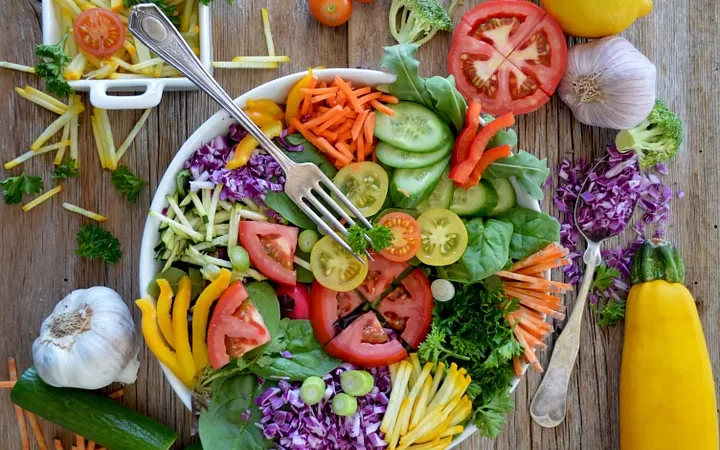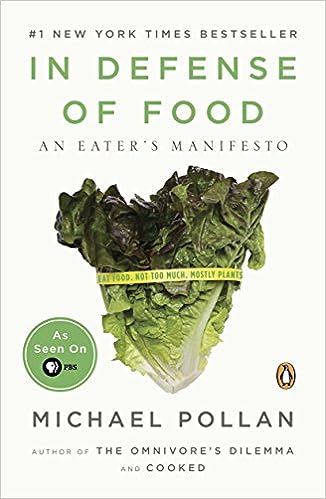Disclaimer: To make this site free for our readers, we earn money from advertising, affiliate sales and sponsorships. Please see our disclosure page for more info on how this works.
*****
The best nutritional advice I’ve found didn’t come from my nutrition class at Stanford.
Yes, I took a nutrition course at Stanford. Well, not actually at Stanford but with Stanford. It was an online MOOC and you can take it too if you like. You’ll find it here. It’s a great course and as someone with a strong interest in food and how it impacts our health I really enjoyed it.
But the best, most useful, most succinct nutritional advice I’ve ever found didn’t come from that course. It came from a random quote that popped up in my Twitter feed one day.
“Eat food. Not too much. Mostly plants.”
— Michael Pollen
Apparently it was originally published in Pollan’s book In Defense of Food: An Eater’s Manifesto, and it’s perhaps the simplest and most effective advice I’ve ever found on the topic of nutrition, although it is, of course, a little more complicated than it seems.
Eat food
This seems blindingly obvious, but it’s not. The average Western diet, and the American diet in particular, is full of food-like substances masquerading as food. If you eat a lot of junk and processed food then a lot of what you’re eating is additives, preservatives, and a whole lot of non-food: what Pollan refers to as “very intricate products of food science that are really imitations of foods.”
A chef friend of mine once suggested that some things that are sold as food are “one molecule away from plastic”. She may have been exaggerating slightly, but it certainly made me re-think buying highly processed foods.
As a general rule real food doesn’t come in lots of packaging and have a long list of ingredients. Eggs are real food. So are carrots. And bananas. If you pick up a packet and it has a dozen ingredients, most of which you can’t pronounce, then some of those ingredients definitely aren’t food.
Not too much
I’m not a huge fan of the typical calorie-restrictive diet. There are reasons that simply eating less doesn’t work for most of us (Matt Stone covers them really well in his book Diet Recovery: Restoring Hormonal Health, Metabolism, Mood, and Your Relationship with Food). However, it’s fair to say that portion sizes in the US have really gotten out of control.
Many of us are simply eating (and drinking) way more than our bodies need or even want. This is perhaps more obvious with sugary drinks than anything else. In the early 1950s the standard coca cola bottle that people would buy in a restaurant or diner was 6.5 ounces, and nobody died of thirst. Now a large coke at McDonalds is 30 ounces, and even a medium is 21 ounces.
Add to this the huge portions in the majority of restaurants, diners and fast food outlets, along with all-you-can-eat buffets, and it’s easy to see why many people overeat. And then there’s snacks, which are considered an essential part of daily life in some Western cultures, but certainly not all. As Pollan says: “The French manage to eat extravagantly rich food, but they don’t get fat, and the reason is that they eat it on small plates, they don’t have seconds, they don’t snack.”
Mostly plants
It used to be widely accepted that eating fruit and vegetables was extremely good for you. Most nutritionists still agree this is the case. But low carb/no carb, high protein diets have also hit the headlines over the last few decades, with many cutting out all or most carbs
(yes, fruits and vegetables are carbs) in the interest of ‘health’ (or at least losing weight).
Eating a plant heavy diet definitely works best for me. While the carb haters can find some science to back them up, there are also all kinds of reasons that it probably works best for most people. Even athletes (watch Game Changers if you’re still convinced you need to follow up every workout with steak and eggs).
As Pollan puts it: “”There is incontrovertible but boring evidence that eating your fruits and vegetables is probably the best thing you can do for preventing cancer, for weight control, for diabetes, for […] all the Western diseases that now afflict us.”
When it comes to food and health, there are definitely variations between different people. So it’s worth experimenting a little if you’re trying to optimise your health. But those three simple pieces of advice are going to work for most of the people, most of the time.
*****
Originally published at Medium.com.
Check out our Health & Wellness Store on Amazon.
Want to improve your life, week by week? Get our free guide, 20 Things To Do Every Week.


